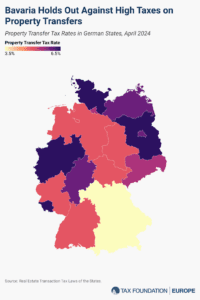
Tax Files under New Council of EU Presidency: Belgium
5 min readBy: ,On 1 January 2024, Belgium took over the six-month rotating presidency of the Council of the European Union from Spain. In a presidency that will be heavily influenced by national and European elections, the Belgian Prime Minister, Alexander De Croo, has already made clear that taxA tax is a mandatory payment or charge collected by local, state, and national governments from individuals or businesses to cover the costs of general government services, goods, and activities. policy will continue to be an important topic of debate.
What Is the State of Play of European Tax Policy?
During its presidency, Spain prioritized the establishment of a common minimum standard for corporate taxation across all Member States (the OECD’s Pillar Two framework) and the reform of fiscal rules. In addition, the Spanish presidency was shaped by European Commission proposals on Business in Europe: Framework for Income Taxation (BEFIT), the Council Directive on Transfer Pricing, and the Council Directive implementing a Head Office Tax (HOT) system for micro, small, and medium-sized enterprises.
European tax policy is currently being shaped by different countries’ implementations of the EU’s Minimum Tax Directive (Pillar Two). Under the EU’s Directive, Member States must commence implementation of the income inclusion rule (IIR) and the undertaxed profits rule (UTPR). Implementing legislation has been fully enacted by four Member States (Denmark, Hungary, Ireland, and Sweden), and has been approved by parliamentary bodies in 11 Member States (Austria, Belgium, Bulgaria, Czech Republic, Germany, Ireland, Luxembourg, Netherlands, Romania, Slovakia, and Slovenia). Two Member States have submitted the draft bill for review by national Parliaments (Finland and France), while seven Member States have published the draft legislation (Croatia, Cyprus, Estonia, Italy, Latvia, Lithuania, and Spain). For their part, Greece, Malta, Poland, and Portugal have not yet published the draft legislation, and five Member States (Estonia, Latvia, Lithuania, Malta, and Slovakia) have been granted the option to defer implementation.
The Spanish presidency undertook technical work on most of the files on deck. On 8 December 2023, representatives of the Economic and Financial Affairs Council of the EU (ECOFIN Council) approved a report to the European Council providing an overview of the progress achieved by the presidency. This report highlights the progress on the UNSHELL Directive proposal (misuse of shell entities in the EU), the EU-wide harmonized withholdingWithholding is the income an employer takes out of an employee’s paycheck and remits to the federal, state, and/or local government. It is calculated based on the amount of income earned, the taxpayer’s filing status, the number of allowances claimed, and any additional amount of the employee requests. tax relief system, also known as the Directive on Faster and Safer Relief of Excess Withholding Taxes (FASTER) as well as technical work related to the exchange of tax information with non-EU jurisdictions, and political support for the EU’s Minimum Tax Directive entering into force in 2024. During its presidency, Spain proposed two approaches to UNSHELL (one in September and the other in November) to gather support from Member States, but failed. Belgium is now tasked with reaching unanimity, but it seems that UNSHELL might not be a priority for Belgium.
Belgium might have better success reaching unanimity on FASTER. According to the ECOFIN report, FASTER seems to have progressed the most as Member States consider the possibility of maintaining the current systems of relief at source.
Regarding new own resources, the Spanish presidency noted general skepticism from EU Member States on the Commission’s proposal for a temporary new own resource based on company profits. Member States seem to be most concerned about the added value of such a new own resource. In addition, the Council seems to welcome the introduction of contributions based on receipts generated by the EU Carbon Border Adjustment Mechanism (CBAM).
What Are the Belgian Presidency Priorities?
Belgium’s presidency will be shaped by the need to reach agreement on some of the files on deck before the European elections. The Belgian presidency intends to prioritize measures aiming to curb tax evasion, tax avoidance, aggressive tax planning, and harmful tax competition. In practice, this means updating the EU’s list of non-cooperative jurisdictions, propelling both legislative and non-legislative initiatives to decrease compliance costs for cross-border investors, and tackling tax abuse related to withholding taxes.
Belgium will engage with the Commission’s proposals and add a unique touch. Belgium welcomed the BEFIT package and mentioned that it will “explore the usefulness of more unified tax rules in other fields over the longer term, such as in relation to mobile workers.” In this regard, the recently agreed upon approach between Belgium and the Netherlands on teleworking might be Belgium’s blueprint at the EU level.
Belgium’s priorities also mention closing the value-added tax (VAT) gap, continuing work on the VAT in the Digital Age Proposal (ViDA) and reviewing the Energy Taxation Directive.
Belgium might also change the EU’s budgetary approach. It is set to finalize the mid-term review of the 2021-2027 Multiannual Financial Framework (MFF) under the purview of the General Affairs Council and organize a conference on the future of the EU budget. Belgium’s Prime Minister De Croo has mentioned that the European Union needs more funding, either from Member States’ contributions, or potentially from EU-wide taxes. This funding, according to De Croo, would not only help the EU cope with current economic demands, but also help increase the EU’s democratic legitimacy.
What’s Next for European Tax Policy?
European tax policy is at an inflection point. Despite the momentum of many proposals on the table, upcoming elections in Belgium—and at the EU level—from June 6-9, could dim the spotlight on Council files.
As the Belgian presidency considers a plan to manage these tax-related files, it should consider principled tax policy. For example, while improving VAT compliance can generate revenue, focusing on the actionable VAT policy gap—the additional VAT revenue that could realistically be collected by eliminating reduced rates and certain exemptions—would be even more beneficial to EU and national budgets, as it can more than triple revenues from the compliance gap.
Regarding BEFIT, Belgium can promote smart, pro-growth tax policy if it truly simplifies filing tax returns for businesses instead of creating One-More-Stop. Additionally, it must bear in mind that BEFIT harmonization at the EU level (e.g., capital cost recoveryCost recovery is the ability of businesses to recover (deduct) the costs of their investments. It plays an important role in defining a business’ tax base and can impact investment decisions. When businesses cannot fully deduct capital expenditures, they spend less on capital, which reduces worker’s productivity and wages. ) should strive to the top, instead of harmonizing to the bottom.
As an honest broker, Belgium is expected to steer negotiations on these proposals among Member States to reach unanimity. But holding the rotating presidency carries significant responsibility, especially as many consider the deadline of some of these files to be the European elections, where the political tides might change intra-EU dynamics.
In such a determinant semester for Europe, principled tax policy can be an important tool for a more competitive European Union.
Stay informed on the tax policies impacting you.
Subscribe to get insights from our trusted experts delivered straight to your inbox.
Subscribe
